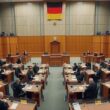The incoming President of the German Federal Council, Andreas Bovenschulte, is pushing for a fundamental restructuring of Germany’s federal financial system, signaling a potential shift in the power dynamic between the national government and the states. In an interview with “Welt” Bovenschulte, currently the Mayor of Bremen, sharply criticized the current piecemeal approach to funding national policies, arguing it fosters public perception of endless political squabbling.
Bovenschulte’s call for reform stems from the contentious financing of recent national tax relief measures, specifically those targeting commuters and the hospitality sector. He advocates for a principle of “who orders, who pays” suggesting that the federal government should bear the full financial burden of its policy initiatives.
The SPD politician expressed particular reservations regarding the commuter tax allowance (Pendlerpauschale), deeming it detrimental to urban centers. Bovenschulte argues the allowance incentivizes commuting from outlying areas, effectively siphoning tax revenue from cities while exacerbating traffic congestion. He voiced similar concerns about the reduction in value-added tax for the hospitality industry, citing a significant strain on the budgets of states like Bremen.
Bovenschulte’s call for reform arrives as he prepares to assume the leadership of the Bundesrat on November 1st. The Council, representing the 16 German states, is scheduled to formally discuss and vote on both the commuter tax allowance and the VAT reduction for the hospitality sector during its December session. Analysts suggest Bovenschulte’s stance indicates a potential hardening of the Bundesrat’s position on federal funding, potentially setting the stage for significant negotiations and a re-evaluation of the long-term sustainability of Germany’s fiscal distribution model. The issue highlights a growing tension between the federal government’s desire for rapid policy implementation and the states’ concerns about fiscal responsibility and the equitable distribution of resources.





